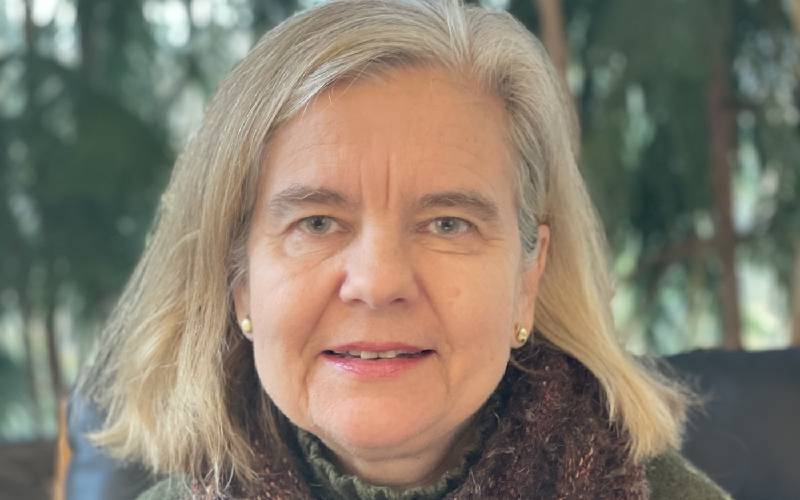“What’s the spiritual room? For me, it does tend to be a connection to something greater than just me; it is a contemplative space; it is getting to the core of who I am, allowing in some ways for the best of me to come to the fore; to have space for grace. I am humbled by what people bring to tell me. I take what I’m doing in the office very seriously because it is really like sacred work in terms of people being able to work, love, and play. I mean that is for them to find their real callings rather than the false selves that they may experience; it’s a similar call for finding one’s true self, and that is really important work.”

Ginta Remeikis, MD
Rockville, Maryland
Episode Description:
We begin by considering the presence of religion as part of the cultural heritage which patients bring to the clinical encounter. Ginta shares with us her upbringing in the Lithuanian Catholic church and its presence in her life, in her journey to medical school and to her psychiatric and analytic training. She speaks of the relationship between her sense of spirituality and God, the importance of Jesus’ human/divine amalgam, and how prayer provides her access to her interiority. We consider the similarities and differences between speaking freely to God and speaking freely to one’s analyst. We discuss the narthex, the church antechamber, and its association with the analytic waiting room and how the structure of the Mass has similarities with the structure of the analytic session. We also consider her reflections on abortion – including a quote from Freud on the topic. Ginta closes by sharing with us her sense of the sacredness of our work.
Our Guest:
Ginta Remeikis, MD, is a psychiatrist and psychoanalyst practicing in Rockville, MD. Having graduated from Northwestern University Medical School, she completed her psychiatric residency at Georgetown and Chestnut Lodge Hospital, where she then served on the medical staff and psychoanalytic training at the Washington Psychoanalytic Institute. Most recently, she has presented at meetings of the APCS (Association for the Psychoanalysis of Culture and Society) and AABS (Association for the Advancement of Baltic Studies) on intergenerational transmission of trauma; diaspora experiences; the psychic role of language, especially bilingualism; the use of literature for processing trauma; and psychodynamics around disability. In 2003 she organized the New Directions weekend conference, “The Future of Religion in the Psychoanalytic World: Revisiting the Mind/Soul Dilemma” and for several years presented on issues of psychiatry and religion to Georgetown’s psychiatry residents. Besides enjoying reading, she has published poetry in Lithuanian in several collections and journals.
Recommended Readings:
Corcoran, Paul, “Seamus Heaney lost his Catholic faith. But his poetry still sought transcendence.” in America; The Jesuit Review, Sept. 15, 2023.
Epstein, Mark, Thoughts Without a Thinker: Psychotherapy from a Buddhist Perspective, Basic Books, 1995.
Greeley, Andrew M., The Catholic Myth: The Behavior and Beliefs of American Catholics, Charles Scribner’s Sons, NY, 1990.
Merton, Thomas, New Seeds of Contemplation, New Directions, NY, 1961.
Rizzuto, Ana-Maria, Why did Freud Reject God?: A Psychodynamic Interpretation, Yale University Press, New Haven, 1998.
Smith, Joseph H. and Susan A Handelman, editors, Psychoanalysis and Religion, Psychiatry and the Humanities, vol. 11, The Johns Hopkins University Press, Baltimore, 1990.
Trinkūnas, Jonas, editor, Of Gods & Holidays; The Baltic Heritage, Tvermė, 1999.

Dr. Schwartz, I usually enjoy your podcast. However, this episode was very frustrating to me as a listener. Many of the questions you posed to Dr. Remeikis seem to have been only vaguely addressed. For example, we did not get much commentary or context on the issue of abortion except for the single quote by Freud and an anecdote about a competitive patient. I still don’t understand the significance of the topic to Dr. Remeikis or her thoughts on it as an analyst and a Catholic (“on sabbatical,” which she never quite delves into, either). This could have been an interesting episode. I hope you will have Dr. Remeikis or another guest on at some point to further explore matters relating to women’s health, politics, religion, and psychoanalysis.
You asked what the German was for the passage about abortion. Here it is: “Man erstaunt auch über die ungeahnten Wirkungen, die von einem künstlichen Abortus…”
Google Translate offers the English as “One is also amazed at the unexpected effects of an artificial abortion…”
I’m thrilled to learn of this podcast. Ginta and I worked together at Chestnut Lodge for many years, from the mid-1980s through the 1990s. She has clearly been productive professionally during the 23 years since the Lodge closed. For the Lodge staff, it’s been a diaspora of sorts, as we’ve all tried to continue pursuing the Lodge’s ideals of commitment to our patients, and the creative pursuit of our intellectual interests.